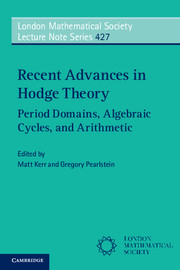Book contents
- Frontmatter
- Contents
- Preface
- Introduction
- List of Conference Participants
- Frontispiece
- PART I HODGE THEORY AT THE BOUNDARY
- (I.A) PERIOD DOMAINS AND THEIR COMPACTIFICATIONS
- 1 Classical Period Domains
- 2 The singularities of the invariant metric on the Jacobi line bundle
- 3 Symmetries of Graded Polarized Mixed Hodge Structures
- (I.B) PERIOD MAPS AND ALGEBRAIC GEOMETRY
- PART II ALGEBRAIC CYCLES AND NORMAL FUNCTIONS
- PART III THE ARITHMETIC OF PERIODS
2 - The singularities of the invariant metric on the Jacobi line bundle
from (I.A) PERIOD DOMAINS AND THEIR COMPACTIFICATIONS
Published online by Cambridge University Press: 05 February 2016
- Frontmatter
- Contents
- Preface
- Introduction
- List of Conference Participants
- Frontispiece
- PART I HODGE THEORY AT THE BOUNDARY
- (I.A) PERIOD DOMAINS AND THEIR COMPACTIFICATIONS
- 1 Classical Period Domains
- 2 The singularities of the invariant metric on the Jacobi line bundle
- 3 Symmetries of Graded Polarized Mixed Hodge Structures
- (I.B) PERIOD MAPS AND ALGEBRAIC GEOMETRY
- PART II ALGEBRAIC CYCLES AND NORMAL FUNCTIONS
- PART III THE ARITHMETIC OF PERIODS
Summary
ABSTRACT. A theorem by Mumford implies that every automorphic line bundle on a pure open Shimura variety, equipped with an invariant smooth metric, can be uniquely extended as a line bundle on a toroidal compactification of the variety, in such a way that the metric acquires only logarithmic singularities. This result is the key of being able to compute arithmetic intersection numbers from these line bundles. Hence, it is natural to ask whether Mumford's result remains valid for line bundles on mixed Shimura varieties.
In this paper we examine the simplest case, namely the Jacobi line bundle on the universal elliptic curve, whose sections are the Jacobi forms. We will show that Mumford's result cannot be extended directly to this case and that a new type of singularity appears.
By using the theory of b-divisors, we show that an analogue of Mumford'sextension theorem can be obtained. We also show that this extension is meaningful because it satisfies Chern-Weil theory and a Hilbert-Samuel type formula.
Introduction
In [10], [11], Faltings introduced the notion of logarithmically singular metrics on a projective variety defined over a number field and proved that they satisfy a Northcott type property, namely that the set of algebraic points not lying on the singular set of the metric with bounded height and degree, is finite. A prominent example of logarithmically singular metric is the Hodge bundle ω on a toroidal compactification of the moduli space of principally polarized abelian varieties of dimension g (with level structure if you do not want to work with stacks) equipped with the Petersson metric.
On the other hand, Mumford [22] introduced the concept of a good metric on a vector bundle, which is a class of singular metrics. He showed that, even being singular, Chern-Weil theory carries over to good metrics. He also proved that the invariant metric on a fully decomposable automorphic vector bundle on a toroidal compactification of the quotient of a hermitian symmetric domain by an arithmetic group is a good metric. This fact allowed him to extend Hirzebruch's proportionality principle to non-compact varieties.
- Type
- Chapter
- Information
- Recent Advances in Hodge TheoryPeriod Domains, Algebraic Cycles, and Arithmetic, pp. 45 - 77Publisher: Cambridge University PressPrint publication year: 2016
- 2
- Cited by



